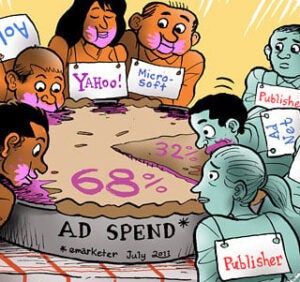 This is the third in a series on companies advancing programmatic buying in Russia. Read our recent Q&As with Yandex and ADFOX.
This is the third in a series on companies advancing programmatic buying in Russia. Read our recent Q&As with Yandex and ADFOX.
As programmatic buying starts to take off in certain countries, finding and analyzing audience data can be a major challenge to getting it off the ground.
In Russia, at least one company has been tackling this issue from the beginning. DMP AiData.me launched in Moscow in 2012, about the same time RTB started to rise in Russia, and now has 15 employees. Most of the company’s work is within the programmatic space, but management has a unique perspective on how data can be used in multiple marketing functions.
“Generally, we share this data with advertising companies but we also see the demand of the DMP for banks and other companies who need more information about their users,” Nikita Rvachev, the COO of AiData, told AdExchanger. “For example, we have some clients who want to change their content on the website based on the data we know about their user.”
Rvachev spoke with AdExchanger.
What is the programmatic space like in Russia right now? Are clients asking to use this technology and data?
NIKITA RVACHEV: The shift started quite quickly last year and now probably all clients are at least asking about this technology. A lot of them are already using it and trying to optimize it.
There are two types of clients. The first type is the big company, slowly making its way. They recently switched from TV to digital and now they are slowly trying to switch from classic media to this programmatic way. For them, it is harder to do and it is more about the industry pushing them to go there, not them pushing the industry.
The second type is a smaller client, mainly from ecommerce. They try different channels, different tools and one day they tried this programmatic way of buying and they saw the results, so they want more data and inventory. The technology leaders or technology maturation pushers are these smaller ecommerce, results-oriented clients.
Who do you consider competitors to AiData?
To be honest, we don’t have a lot of DMPs here in Russia. We don’t have direct competitors for the same product that we offer. We are involved with data and understanding people and how we can utilize this data and make better decisions. So we see our main competitors as companies like Google or Yandex or social networks. Russia is an interesting market because for each big company you have in Europe or America like Google or Facebook, we have a clone-like Russian company here. For example, Yandex is a search company and Vkontakte is a social company. They have a lot of information about users.
AdExchanger Daily
Get our editors’ roundup delivered to your inbox every weekday.
Daily Roundup
You said there weren’t that many DMPs in Russia now, but is that changing? Are companies starting to move into the space because they see the opportunity?
Some companies are veering into the DMP approach, but I would say there are two types of companies. DMP companies like us process data and then there are other types of companies that just supply the data. We have a lot of these data-supplying companies, like the clones and a lot of different websites or portals that share this data. But if you are talking about DMPs trying to process this data, there are not a lot of them. You can’t just make a good DMP in a month or two. You have to have data science people and understand how to process this data. A lot of small startup companies try to enter this market and are stopped because it is hard to do. There are some DMPs that try to analyze specific data, but I would not say that there are a lot of general DMPs in the market.
Right now, is it mostly local and domestic companies doing programmatic in Russia? Or are some international brands, like Google, working to get into the space?
It started more locally, because there are companies like ADFOX, Yandex, Between Digital and other SSPs. But international companies are starting to look to the market as well, mostly Google.
We also speak with a lot of companies in Europe and we see that they do have demand for Russia, but we have different rules from Europe so it’s hard to come here. The language is a challenge. You have to have completely different technology to process and aggregate data in Russia, so international companies are looking for local companies like us to support them. They are making these first steps, from the big companies like Google or the agencies trying to do the same that they’re doing in Europe, but it’s not as quick of growth as everyone wants.
For our company in general, we are not only in the Russian market. We have headquarters here and we are focused on the Russian market, but we also have data outside of our country, mostly the previously USSR countries such as Ukraine, Belarus and Kazakhstan. The next step is EMEA, mainly focused on Eastern Europe, in places like the Nordic countries, Poland and so on.
What is AiTarget.ru? How are you connected?
AiTarget.ru is another separate company and it is a DSP solution. Our data is synced with this DSP; there is a contract. But legally, they are two separate companies. Ilya Lagutin, the CEO of AiData, is part of both teams, but otherwise, there are two separate companies working on and managing the campaigns; they are different companies.
In Europe and Russia, people very are concerned about the data and their security of the data and so on, so that’s why we separated these companies.
What are your goals for the company over the next year or so?
A huge focus for us is new technology and development of this data science approach, so we are spending a lot of time connecting people between different devices. We see the opportunity and challenge now when seeing the same person on the different devices – spending time on mobile and switching to the computer. Right now, the DSPs think these are different people and we’re working to solve this problem.
This year and next year, one of our main goals and focus is offline data and mating it with online and trying to find the intersection of this data. We are also seeing a growing demand for mobile. In Europe, it’s a huge topic now, but in Russia, it just started growing and we are trying that as well.













